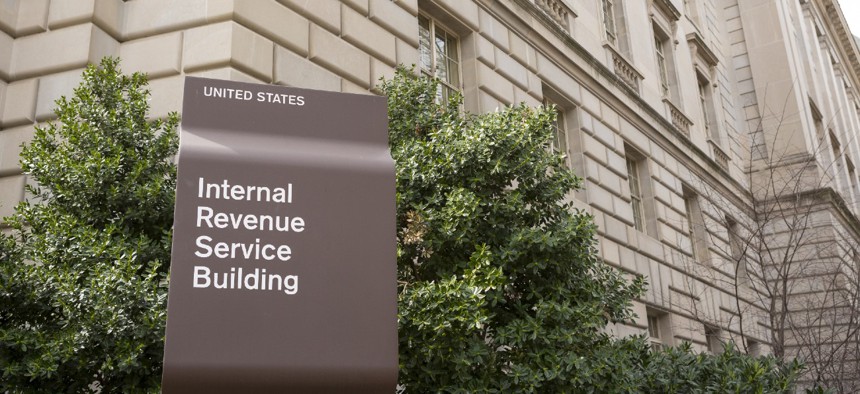
By Rob Crandall / Shutterstock.com
Coronavirus Roundup: Watchdogs Suggest Improvements for IRS and OSHA’s Pandemic Operations
There's a lot to keep track of. Here’s today’s list of news updates and stories you may have missed.
President Biden said on Tuesday that the administration expects to have enough vaccine doses for all adults in America by the end of May, but noted that the doses aren’t enough––they also need enough vaccinators. Additionally, the administration announced that Johnson & Johnson and Merck, two of the largest health care and pharmaceutical companies in the world and normally competitors, would be working together to increase production of Johnson & Johnson’s vaccine. “This is the type of collaboration between companies we saw in World War II,” said Biden. “We also invoked the Defense Production Act to equip two Merck facilities to the standards necessary to safely manufacture the J&J vaccine. And with the urging and assistance of my administration, Johnson & Johnson is also taking additional new actions to safely accelerate vaccine production.” Here are some of the other recent headlines you might have missed.
Five top House Democrats wrote to the White House, Centers for Disease Control and Prevention, and Labor Department on Tuesday asking them to better address aerosol transmission of the coronavirus. They cited a letter from a group of experts on the issue claiming the current CDC guidance is outdated.
The Health and Human Services Department announced additional political appointments on Tuesday. “President Biden’s team at HHS is growing quickly and continues to work tirelessly to end the COVID pandemic and address our many health challenges,” said HHS Chief of Staff Sean McCluskie. “Our appointees will work hand-in-hand with our dedicated team of career officials throughout HHS to protect and expand quality, affordable care to all Americans.”
The Senate Finance Committee vote on Xavier Becerra’s nomination to be HHS secretary on Wednesday morning was tied, along party lines. Therefore, Senate Majority Leader Chuck Schumer, D-N.Y., “for the first time will need to use expedited discharge powers in the organizing resolution to bring him to the floor,” National Journal reported.
The Government Accountability Office said earlier this week that the Internal Revenue Service needs to address problems that arose during the 2020 tax filing season, which was upended by the pandemic, as the 2021 one is underway. “Faced with an unprecedented crisis, IRS took steps to manage disruptions to the filing season while protecting the integrity of its mission and health of its employees. Nonetheless, IRS’s reliance on manual processing led to a significant backlog of paper-based and manual work,” GAO’s report said. “Further, it is unclear the extent to which business taxpayers faced delays in receiving refunds because IRS does not regularly monitor its progress in processing business tax refunds.” Lastly, the agency hasn’t fully reviewed the risks to this year’s filing season “and continues to struggle with addressing challenges from the 2020 filing season, including reduced staffing and delayed processing of returns and issuing refunds.” Of the seven recommendations GAO gave, the IRS agreed with four and disagreed with three.
GAO released its biennial high-risk list on Tuesday and many of the challenges involved or were impacted by the pandemic. For example, “even before the COVID-19 pandemic, rates of drug misuse had increased from 2002 through 2019, and the rates of drug overdose deaths had also generally increased nationally from the early 2000s through 2019,” said the report. But now, responding to drug misuse will be even more challenging due to the fact that many of the agencies charged with doing so are focused on the pandemic. Another risk identified was preventing fraud in Small Business Administration loan programs, such as the Paycheck Protection Program and Economic Injury Disaster Loans for the pandemic, said the watchdog.
The Labor Department inspector general reported on Tuesday that while the Occupational Safety and Health Administration has taken steps to protect workers from the pandemic, “increased complaints, reduced inspections and most inspections not being conducted onsite subject employees to greater safety risk.” Also, while the agency issued guidance based on CDC, Food and Drug Administration and Environmental Protection Agency guidelines, it “is not enforceable” and “guidance in and of itself cannot operate in lieu of an [emergency temporary standard] as an enforcement tool,” which the IG thinks would be helpful. The IG’s review spanned February 1, 2020, to October 26, 2020, which was during the Trump administration. Biden issued an executive order on January 21 that addresses some of the concerns in the report.
Upcoming: White House Press Secretary Jen Psaki will give a briefing at 12:30 p.m.
Today’s GovExec Daily podcast episode discusses the future of in-office work after the pandemic ends.
Help us understand the situation better. Are you a federal employee, contractor or military member with information, concerns, etc. about how your agency is handling the coronavirus? Email us at newstips@govexec.com.







